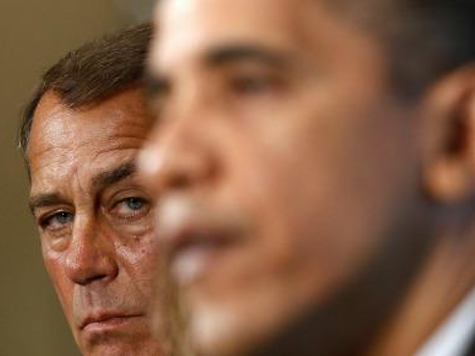
As the federal government enters day three of a partial shutdown, talk in Congress is turning increasingly to a “grand bargain” that would include entitlement and tax reform as a way to resolve the current fiscal impasse. Rep. Steve Stivers, a close Boehner ally, even floated the idea that “revenue”, i.e. higher taxes, could be part of this “bargain.”
There is no clear path to reopening government right now. Obama and Senate Democrats continue to refuse to negotiate or compromise on legislation to provide new government funding. In just two weeks, however, the federal government is set to hit its debt ceiling, exhausting its borrowing authority. After this, the government will have to pay its bills out of continuing tax collections, necessitating dramatic cuts in spending or a default on the nation’s existing debt payments.
As the government shutdown and debt ceiling issues intertwine, many in the GOP believe that only a “grand bargain” on spending and revenue is a big enough vehicle to restore government funding and lift the debt ceiling. During the last debt ceiling negotiations, in 2011, the GOP was close to agreeing to a similar “grand bargain.” The deal fell apart in the 11th hour, however, because President Obama increased his demands for new revenue.
This experience should caution the GOP against unilaterally proposing another “grand bargain” at this time. Obama and the Senate Democrats seem incapable of negotiating in good faith. The rhetoric they currently employ against Republicans does not suggest they are ready to cede ground on fiscal issues in any meaningful way. It is hard to imagine Harry Reid shifting from calling Republicans “anarchists” to treating them as honest brokers in a substantive negotiation over the nation’s fiscal policy.
Theoretically, a “grand bargain” could be a good idea, given the urgent need to reform the nation’s entitlement programs and tax code. In reality, however, with Republicans only controlling the House, any “grand bargain” is likely to be light on spending reform and heavy on tax hikes.
If Republicans take control of the Senate in 2014, which is increasingly likely, conservatives and moderate Republicans would be in a better position to push a “grand bargain” that would contain meaningful reforms that could boost the economy.
Policy considerations, however, may yield to internal GOP politics. Paul Ryan, who was granted a special waiver to continuing chairing the Budget Committee, is eager to strike a significant budget deal while he has the gavel. Rep. David Camp, too, is entering his final term chairing the Ways and Means Committee and is anxious to enact some kind of tax reform while he heads the committee. Their desire for a personal legacy will make them strong advocates for a “grand bargain,” despite the GOP’s relatively weak hand.
The GOP faces a series of tough choices over the next two weeks. So, too, do Obama and the Senate Democrats. Much of the current situation is due to the inability of the Senate to produce a regular budget over the past five years. The failed stimulus program, bailouts, expanded welfare payments and new entitlements like ObamaCare has caused government spending to skyrocket, pushing the national debt to unsustainable levels. Even a mainstream media black-out can’t forever keep those facts from the American public.
The onus isn’t on Republicans to solve the nation’s fiscal crisis. President Obama and Senate Democrats have brought us to this point. It should be up to them to steer us out of it.

COMMENTS
Please let us know if you're having issues with commenting.